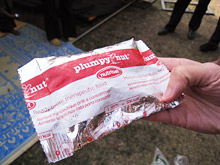Autumn 2009: Of Note

The winning Global Health competition team with Vice President Jeff Koplan.
Tony Benner/Special

Global good: Symposium speaker Afzaal Malik, director of international government relations at The Coca-Cola Company.
Tony Benner/Special

Mack D. Male/Special
Feeding children for—and with—peanuts
Bold ideas, speakers heard as part of first Global Development and Health week
By Rebecca Baggett 99MPH
A sweet, peanut-butter-based food called Plumpy’nut, which comes in a simple foil wrapper, has become a powerful tool in the fight against world hunger. Plumpy’nut has a two-year shelf life and requires no water preparation or refrigeration, making it easy to use in difficult conditions to treat malnutrition.
But the logistics surrounding how to distribute such “therapeutic foods” safely and efficiently are complex. Plumpy’nut must be given under medical supervision, and the child’s health status has to be determined by a doctor or a nutritionist.
How to best provide the high-protein, high-energy food to severely malnourished children in Ethiopia was the focus of Emory’s inaugural Global Health Case Competition in April at the School of Medicine.
The competition brought together students from different disciplines and schools to take on a real, critical global health challenge. “All eight teams did a spectacular job of exploring the issue of severe acute malnutrition in Oromiya, Ethiopia,” said Brian Goebel 09B. Goebel, along with other members of the Emory Global Health Institute’s (EGHI) Student Advisory Committee, coordinated the competition, which was cosponsored by Candler School of Theology and the Graduate Student Senate.
The student teams were given five days to prepare, then presented their cases to a panel of judges that included Chancellor Michael Johns; Associate Professor of Theology Noel Erskine; Tarun Gulrajani 05PH, senior associate at PricewaterhouseCoopers; and Christopher Howard, a Centers for Disease Control and Prevention epidemiologic intelligence officer.
“The conjoining of religion and economics, the health sciences with business strategies, on behalf of the poor and marginalized gave us a glimpse of Emory at its best,” Erskine said.
The winning team comprised students from Candler, Emory College, Goizueta Business School, and the Rollins School of Public Health.
“It may sound cliche, but the most rewarding aspect of competing in the Global Health Case Competition was getting to know people from the other schools,” said Candler graduate student Joshua Case 11T. “Knowing that we can make a difference if we work together across disciplines is one thing. Knowing how to communicate across those differences is another thing altogether.”
Complementing the global health competition, and held during the same week, was a Global Development and Health Symposium, initiated and coordinated by Chris Brown 09B and cosponsored by the EGHI and Goizueta. Bringing a background in investment banking and global development work to Emory, Brown saw an opportunity to bring these communities together.
Symposium speakers, who examined the role business can play in promoting good health and sustainable development around the world, included John McArthur, CEO of Millennium Promise, Bruce McNamer, CEO of Technoserve, and Afzaal Malik, director of international government relations at The Coca-Cola Company.
“The symposium was a first for Emory—a marriage of global health, development concerns, and the business school that brought together diverse University populations,” says Vice President for Global Health Jeff Koplan.